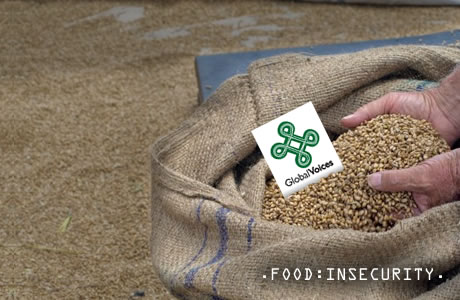
This post was commissioned as part of a Pulitzer Center/Global Voices Online series on Food Insecurity. These reports draw on multimedia reporting featured on the Pulitzer Gateway to Food Insecurity. Share your own story on food insecurity here.
While there have been significant increases in agricultural productivity in Asia and Latin America over the last 30 years, productivity in Africa has stagnated and 1 in 3 people in sub-Saharan Africa still go chronically hungry. Many solutions have been proposed to help combat hunger in Africa, but one in particular remains controversial: biotechnology. The Food and Agriculture Organization of the United Nations estimates that 1.02 billion people do not have enough to eat in the world; more than a fourth of these people live in sub-Saharan Africa. The reasons for the region's food insecurity range from economic crisis to an expanding population. In a Penn State University blog on biotechnology, Dr. Terry Etherton in the United States elaborates on these challenges:
In sub-Saharan Africa, where more "ultrapoor" live, developing technologies to boost productivity is especially difficult because of greater threats from pests and diseases, poorer soil, and drought. In addition, Africa's R&D [research and development] establishments are small compared to those of South Asia—half had fewer than 100 scientists in 2000. Compared to Latin America, Africa has less than half the rural roads per hectare, 1/40th the capital per farmer, and 1/50th the rural electricity supply per worker. Despite some success with maize [corn], cassava, and some horticultural crops, few African countries have experienced a Green Revolution.
On a global scale, Africa uses the least fertilizers, pesticides and hybrid or genetically modified (GM) seeds of any continent, although many experts suggest that genetically modified organisms (GMOs) could help ensure food security by increasing crop yields, producing hardier crop varieties, enhancing a crop's nutritional value, and improving storability. Others claim there are numerous risks associated with adopting GMOs in Africa. Bloggers following the debate alternately wonder whether Africa is being bullied into accepting biotechnology, or whether Africans are being needlessly scared off by anti-GMO activists. Journalist Gregory Simpkins in Washington D.C outlines the debate in his personal blog Africa Rising 2010:
Those who don't trust what they see as Big Science and capitalists, believe GM agricultural products are "Frankenfood." Those alarmed by the rise in both malnutrition and food prices see a crisis that may be alleviated by using science to jump-start the Green Revolution in Africa. The problem is that there is not enough evidence that these products are either unjustifiably dangerous or completely safe. Africa's brain drain doesn't make this situation any easier since many of the scientists who could ensure that their homelands don't use unsafe agricultural products or take advantage of existing technology to prevent starvation live and work in other countries.
Resistance to GMOs is high. Currently South Africa is the only country on the continent to have approved GM seeds for planting. Reporter Philip Brasher traveled to South Africa and Kenya to chronicle the role of biotechnology in an article series for the DesMoines Register sponsored by the Pulitzer Center on Crisis Reporting. He says more than 70 percent of South Africa's latest corn crop, the country's largest in decades, is biotech. While some African countries have allowed imports of this GM corn as food aid, others, such as Zimbabwe have rejected these products despite the need. The U.S. government and American biotech companies say Africans should drop their opposition to GM crops in order to help feed the continent. The Bill and Melinda Gates Foundation has also jumped on board, by helping to set up the Alliance for a Green Revolution in Africa (AGRA) in 2006, and more recently by funding research to engineer more drought-resistant corn. Some agriculture experts in Africa are also calling on Africans to embrace agricultural technologies to boost food production. The blog GMO Africa also believes Africans should be able to take advantage of biotech:
"An open-door policy to new technologies, especially in the field of agriculture, is what Africa needs. When activists intimidate Africa, through fear, into not exploring potential benefits of GM foods, the continent suffers. They stymie a rational debate about whether GM foods have any relevance to Africa."
However, many bloggers are weary of widely introducing GMOs in a continent comprised mostly of small farms. An article on the progressive pan-African website Pambazuka News by Nidhi Tandon outlines the concerns:
The risks to Africa of fully adopting industrial agriculture in general and GM seeds in particular include: - transferring its food and farming decisions to global corporations - losing ecological and agricultural diversity as genetically modified crop varieties spread, and driving small- and medium-scale family farmers off their land because they cannot afford the expensive inputs, including genetically modified seeds, that industrial agriculture demands."
In South Africa itself, reactions to GMOs also remain mixed. On the blog of a South African family that cultivates "heirloom" and open pollinated seeds, called Livingseeds, Sean Freeman says there isn't enough evidence to support GMOs even though they were "forced onto the South African public":
'All the evidence' shows that GMO is the best thing since sliced bread, however the problem we have is that all of the evidence is slanted and prepared by a) GMO houses b) Scientists that have their research grants supplied by GMO houses or c) Universities that are sponsored by GMO houses. All impartial evidence is wiped sorry forced sorry explained away and serious anecdotal evidence is discredited as not having any scientifically credible weight, as it's not…… scientific. However here is some anecdotal evidence that is pretty indisputable.
Freeman links to a news story about widespread crop failures in South Africa in 2008/9 due to "a breeding error" in genetically engineered seeds sold by the global corporation Monsanto. An online petition initiated by the African Center for Biosafety says Monsanto compensated commercial farmers who lost their yield but banned them from speaking to the media, and made no mention of whether they compensated resource poor farmers who were given the seed and lost their yield as well. Most agricultural experts do agree that GMOs alone won't solve Africa's hunger issues. Other solutions suggested by bloggers include organic farming, growing your own food, and promoting social change. Whatever the solutions, on Africa Rising 2010 Simpkins argues we need to openly consider all options, including biotechology:
The behind-the-scenes debate over GM foods needs to be brought into the open and examined carefully. Promoting products that may be dangerous is unacceptable. However, in the face of growing hunger in Africa, we owe it to the hungry to explore every possibility for meeting their needs while they still live.




